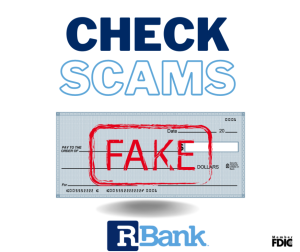Spot, Avoid, and Report Fake Check Scams
In the digital age, our society has seen an unprecedented shift in how we manage our finances. From online banking to mobile payment apps, convenience has taken center stage. But as financial technologies evolve, so do the techniques scammers use to deceive and defraud unsuspecting victims.
Today, we are going to examine a scam that has been on the rise: fake check scams. These scams can be difficult to spot and often result in financial loss.
What Are Fake Check Scams?
Despite the widespread use of digital payments, checks remain a fundamental part of the banking world. But their continued relevance has made them a prime target for fraudsters.
Fake check scams usually involve the scammer sending you a check. They then ask for money back, often claiming it is a job offer, lottery prize, or online sale.
The catch? The check is fake. But you won’t realize it until after you’ve deposited it and sent the “refund.”
Spotting a Fake Check Scam
Here are some signs to watch out for:
- Someone sending you a check for more than they owe can be an indicator of fraud. Requesting you to return the excess amount is a red flag.
- Scammers often push their targets to deposit the check and transfer money before the bank can verify it. This pressure to act quickly is a common tactic.
- It is likely a scam if someone requests money to be sent through unusual means. Anytime you are asked to purchase gift cards, and either send the card, or numbers off the card to someone – it is 100% a scam!!!
- Be cautious if someone offers you a large amount of money for little effort. Similarly, be wary if you have supposedly won a lottery without entering.
- Unprofessional Communication: Spelling mistakes, grammar errors, and unprofessional language in the communication could be a sign that it’s a scam.
How to Avoid Fake Check Scams
- Know Who You’re Dealing With: Never accept a check from someone you don’t trust, especially if they overpay and ask for a refund of the difference.
- Verify Before You Trust: If someone you don’t know sends you a check and asks for money back, verify the check’s authenticity with your bank before proceeding.
- Slow Down: Scammers will pressure you to act quickly before you have time to think.
- Be Wary of “Too Good to be True” Offers: If something seems too good to be true, it probably is.
Reporting Fake Check Scams
If you believe you’ve been targeted by a fake check scam, take the following steps:
- Contact Your Bank: If you have deposited the check, contact your bank immediately. They can guide you through the steps you need to take to mitigate any financial loss.
- Report to Local Law Enforcement: Always report check fraud to your local law enforcement agency. They can investigate the matter further and potentially prevent others from becoming victims.
- Report to the Federal Trade Commission (FTC): You can report the scam to the FTC at ftc.gov/complaint. The FTC plays a key role in tracking down and prosecuting these fraudsters.
- Report to the US Postal Inspection Service: If you received the check through the mail, you can report the fraud to the US Postal Inspection Service.
Our world continues to change and evolve, and with it, so do the threats we face. But by staying informed and vigilant, we can protect ourselves and our communities from these deceptive practices.
Remember, when in doubt, err on the side of caution. It’s better to ask questions and verify authenticity than to fall victim to these scams.
As your trusted community bank, we’re committed to providing the information and resources you need to navigate your financial journey safely. Together, we can ensure a secure financial future for all of us. So, stay informed, stay alert, and let’s continue to protect each other in this ever-evolving digital world.
It’s important to remember that scammers will use any avenue they can to get access to your personal information. That includes phishing attempts via emails, text messages, and even calls. Be wary of any messages that appear to be from a legitimate company but request that you provide personal information. They may also ask for payment via wire transfer, prepaid debit cards, or gift cards.
Legitimate companies will never request personal information or payment from you. This is important to remember. Such requests should not be fulfilled. If you do receive requests like these, do not respond and instead contact the company directly to verify the request.
If you suspect you have been the victim of a scam, contact your bank or financial institution immediately. They can help you determine the best course of action and protect your financial interests. Additionally, be sure to report any suspicious activity to the proper authorities.
When it comes to online security, it’s also important to practice good digital hygiene. Be sure to use strong passwords and never share them with anyone. When using a shared computer, remember to log out of any online accounts after you have finished using them. Additionally, keep your computer and mobile devices updated with the latest security patches and anti-virus software.
Finally, always be aware of your surroundings. Be cautious when someone requests payment or personal information in a public place. Ask questions and verify their identity before complying. This goes for both online and in-person interactions.
By staying informed and vigilant, we can protect ourselves and our communities from deceptive practices. Remember, when in doubt, proceed cautiously. By taking the necessary precautions, we can help ensure a secure financial future for all of us. Together, we can stay informed, stay alert, and protect each other in this ever-evolving digital world.
By: Mark Kesselring, SVP
Information Security | Facilities | Corporate Security



